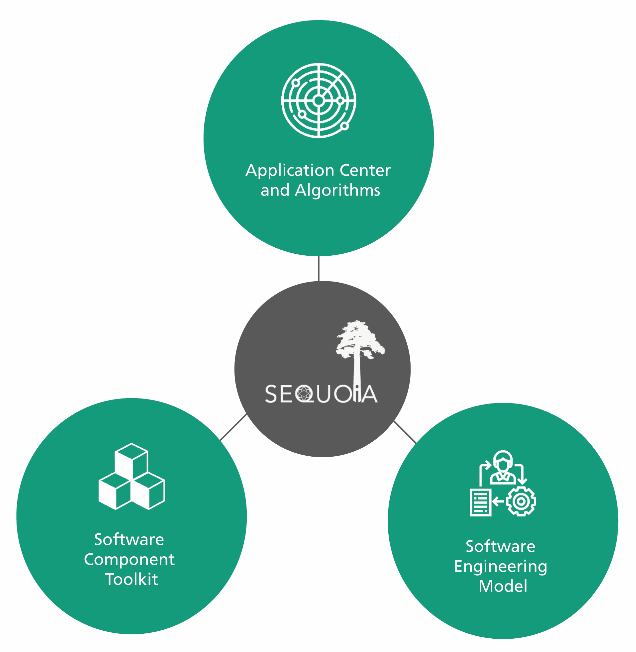by Christian Tutschku and Chiara Stephan (Fraunhofer IAO)
Quantum computing (QC) has attracted great interest in recent years. The long-term potential of quantum computing in industrial applications is well-known, but contemporary quantum solutions need to incorporate all the characteristic hardware restrictions that define the computers of today’s noisy intermediate scale quantum (NISQ) era. The main goal of the applied research project SEQUOIA [L1] is to develop near-term, hybrid quantum solutions for industrial use cases in close collaboration with companies of its enterprise network. As such, the SEQUOIA project directly elaborates on the path from the quantum computing theory towards near-term industrial applications.
The “Competence Centre Quantum Computing Baden-Württemberg" [L2], led by the Fraunhofer Institutes for Industrial Engineering IAO and Applied Solid State Physics IAF, conducts application-oriented quantum research towards the next generation computing (NGC). It is part of the cooperation between Fraunhofer and IBM, which together provide exclusive access to IBM’s first European quantum computer, located in Ehningen, Baden-Württemberg. The Fraunhofer corporation in particular offers access opportunities for external partners, such as universities or companies. The contractual regulations for operating the quantum computer are subject to German law, and European and German data protection regulations are complied with.
Within this competence centre, the SEQUOIA project is funded by the state Ministry of Economics, Labour and Tourism of Baden-Württemberg. Coordinated and guided be the Fraunhofer IAO, the SEQUOIA project was launched in the beginning of 2021 and pools, as a joint research project, competences from the Fraunhofer IAF, the Fraunhofer Institute for Manufacturing Engineering and Automation IPA, the FZI Research Centre for Information Technology, the Chair of Embedded Systems at the Eberhard Karl University of Tübingen, as well as the University of Stuttgart with both, the High Performance Computing Centre HLRS and the Institute of Architecture of Application Systems IAAS.
To unlock the enormous potential of quantum computers, new software engineering methods and processes are required. Thus, the SEQUOIA project is investigating, developing, and testing new methods, tools, and approaches for QC, to improve and accelerate industrial quantum applications. These solutions are being developed in close collaboration with SEQUOIA’s industrial partners, tested on local or cloud-based QC simulators, and finally are executed on real quantum hardware – the IBM Q System One in Ehningen close to Stuttgart. With this approach, the joint research project SEQUOIA elaborates on new and more efficient quantum solutions in different application areas with a special focus on manufacturing, engineering, logistics, and energy economics. It is further conceivable that quantum technology in general can be used for the exact prediction of scenarios in which multi-layered and complex data play a key role, such as portfolio predictions and weather forecasts, traffic flows, and disease patterns. In summary, within the SEQUOIA project, we are developing a variety of (hybrid) quantum algorithms, contributing to the following main outcomes (Figure 1):
- The SEQUOIA application centre for quantum computing
- The SEQUOIA tool kit, containing use case inspired quantum software components for industrial applications and algorithms
- The SEQUOIA model for quantum software engineering

Figure 1: Key outcomes of the SEQUOIA Project. (Icons made by Freepik and Eucalyp from www.flaticon.com).
The input of the SEQUOIA enterprise network is crucial to achieving these outcomes. In particular, the project’s outcomes are elaborated by studying several industrial use cases, focusing on six representative cases for industry in Baden-Württemberg. These include combinatorial optimisation problems related to the e-mobility and manufacturing industry; solving (coupled) differential equations to support computational fluid dynamic (CFD) calculations; or solving varieties of the travelling salesperson problem (TSP) in the area of logistics, sustainably optimising routing-problems. All this is achieved by involving right from the beginning several key players from different industrial areas. Moreover, these use cases directly allow for an application-related validation of the developed quantum solutions, which are eventually integrated in a high-level API for hybrid quantum applications – the (open-access) components of the SEQUOIA tool kit. From a software engineering perspective, the reliability of the provided quantum solutions is crucial. To this end, the project also addresses the questioning of how to improve the correctness and the quality of its developed quantum applications in the scope of error mitigation techniques.
All these results are directly transferred into the enterprise network and the entire (industrial) community through workshops, presentations, and training programs. For instance, in the coming year, the Fraunhofer IAO will run a comprehensive QC training program, consisting of several QC lectures, hands-on workshops and (open) networking events [L3]. These will be held within the "Competence Centre Quantum Computing Baden-Württemberg", together with the Fraunhofer IAF. Registrations for this program are now open for anyone interested in application-based QC algorithm design, whether from software or computer science research or development, or from business consultancy. Depending on the level of knowledge required, we offer access to the IBM Q System One, in particular addressing the peculiarities of gate-based QC on real (IBM) quantum architectures. The Fraunhofer IAO also run regular hour-long QC webinars, “DigitalDialoge”, which provide an easy introduction to quantum computing.
The findings of the SEQUOIA project will soon be published as a part of the application-oriented SEQUOIA QC user study, which provides insights into all the above-mentioned topics. We are also pleased to be part of the upcoming OOP-software meets business conference on 3 February with a night school session on QC Applications - State of the Art and Future Roadmap [L2].
Links:
[L1] https://www.digital.iao.fraunhofer.de/de/leistungen/Quantencomputing/Sequoia.html
[L2] Competence Center Quantum Computing Baden-Württemberg: Fraunhofer Institute for Industrial Engineering IAO: https://www.digital.iao.fraunhofer.de/de/leistungen/Quantencomputing/KQC_BW.html and Applied Solid State Physics IAF: https://www.iaf.fraunhofer.de/en/networkers/KQC.html
[L3] https://www.digital.iao.fraunhofer.de/de/leistungen/Quantencomputing/Schulungsangebot_Quantencomputing.html
[L4] https://www.oop-konferenz.de/oop-2022/programm/speaker/sprecherdetails/christian-tutschku-11886
Please contact:
Christian Tutschku
Fraunhofer Institute for Industrial Engineering IAO, Germany











